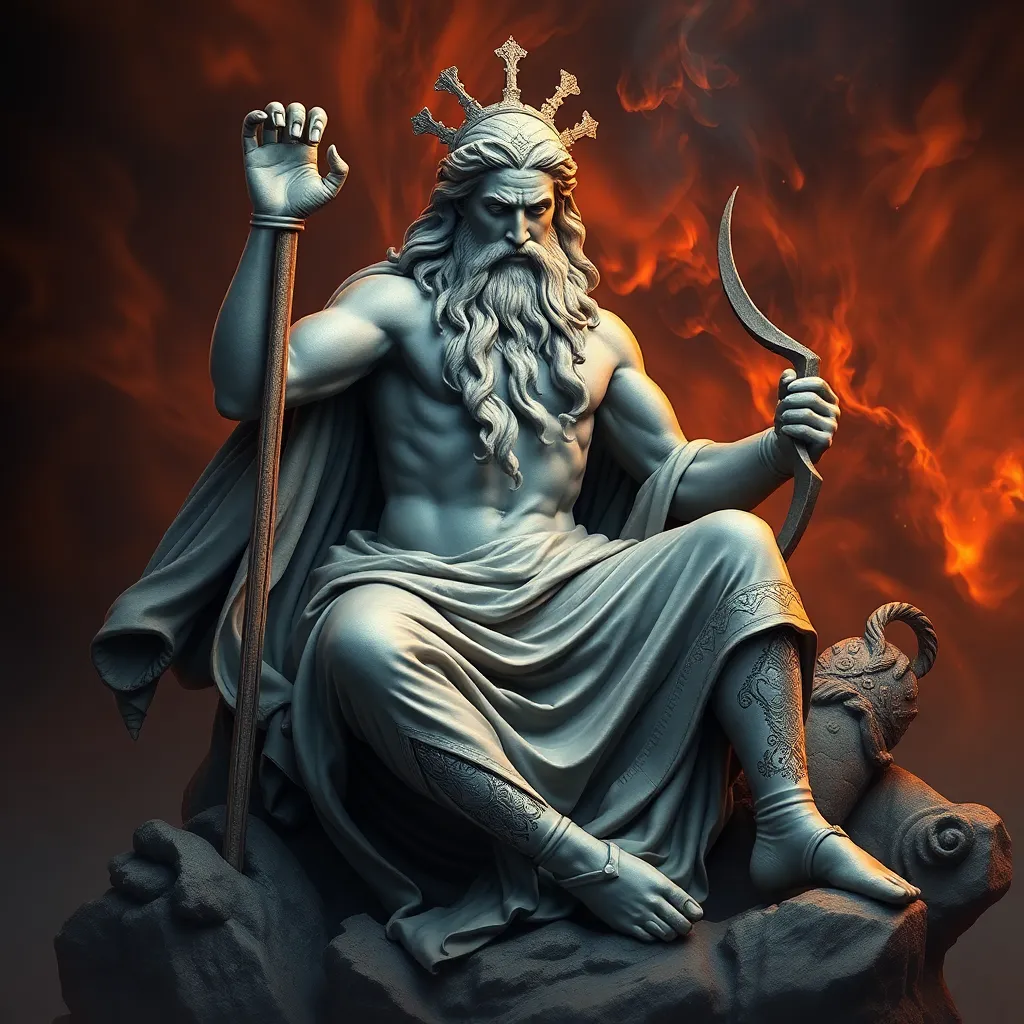Zeus and the Role of Fate in Greek Myths: A Complex Relationship
I. Introduction
In Greek mythology, Zeus stands as the king of the gods, wielding immense power and authority over both divine and mortal realms. As the ruler of Mount Olympus, he is often depicted as a figure of justice, order, and strength. However, alongside Zeus, the concept of Fate, represented by the Moirai, plays a crucial role in shaping the destinies of all beings. The Moirai, or Fates, are the personifications of destiny that weave the threads of life, determining the lifespan and fortune of every individual. This article explores the intricate dynamics between Zeus and Fate, revealing the complexities of divine power and human destiny in Greek myths.
II. The Nature of Zeus: God of Thunder and Authority
Zeus, often referred to as the god of thunder, is characterized by several attributes and symbols that highlight his authority:
- Thunderbolt: His most recognized weapon, symbolizing his power to enforce justice.
- Aegis: A protective cloak often associated with divine protection.
- Eagle: A symbol of strength and sovereignty, representing his role as king.
Zeus’s primary responsibility is to maintain order and justice among both the gods and mortals. As the arbiter of divine law, he ensures that the balance of power is upheld, punishing those who defy the established order. However, a critical contrast arises between Zeus’s authority and the immutable concept of Fate. While he can influence events through his will, the Fates ultimately determine the outcome of all lives, illustrating a complex interplay between divine authority and predestination.
III. Understanding Fate: The Moirai and Their Significance
The Moirai, often depicted as three sisters—Clotho, Lachesis, and Atropos—embody the concept of Fate in Greek mythology:
- Clotho: The spinner of the thread of life.
- Lachesis: The measurer who determines the length of one’s life.
- Atropos: The cutter who decides when life ends.
The Moirai hold significant power in determining the destinies of both gods and mortals. Their roles highlight the tension between autonomy and predestination, as even the gods are subject to their decrees. Various myths illustrate the power of Fate, showcasing how it can override the intentions of even the mightiest deities.
IV. The Tension Between Zeus and Fate
Throughout Greek mythology, there are several instances where Zeus attempts to alter or circumvent Fate:
- In many tales, he intervenes to protect his favored mortals or to punish transgressors.
- However, such interventions often lead to unforeseen consequences that disrupt the natural order.
This tension is evident in various myths where Zeus’s attempts to assert his will are thwarted by the Fates’ authority. For instance, his desire to protect his son Hercules from a preordained fate ultimately leads to a series of tragic events.
V. Case Studies: Notable Myths Showcasing Their Relationship
Several notable myths exemplify the intricate relationship between Zeus and Fate:
A. The story of Oedipus
The tale of Oedipus is a poignant illustration of Fate’s inescapability. Despite Zeus’s attempts to guide the characters, the Fates have already determined Oedipus’s tragic destiny. His efforts to avoid the foretold prophecies only lead him closer to their fulfillment, underscoring the theme of fate’s dominion over free will.
B. The tale of Prometheus
In the myth of Prometheus, the titan defies Zeus by stealing fire for humanity. Zeus’s wrath leads to Prometheus’s eternal punishment, yet this act also sets into motion a chain of events that aligns with the concept of fate. Prometheus’s actions reflect the struggle between divine authority and the preordained consequences of defiance.
C. The Iliad
In Homer’s Iliad, Zeus grapples with the constraints of Fate during the Trojan War. Despite his attempts to influence the war’s outcome, the Fates remain unyielding, illustrating the limitations of even the most powerful god in the face of destiny.
VI. Philosophical Interpretations of Fate and Divine Will
Ancient Greek philosophers offered various interpretations of fate and its implications for free will:
- Heraclitus: Suggested that everything is in a state of flux, implying that fate is ever-changing.
- Plato: Proposed that the soul’s choices can influence its fate, providing a nuanced view of free will.
- Aristotle: Argued that while fate exists, human actions can still play a significant role in shaping outcomes.
These philosophical perspectives reflect the complex relationship between fate and human existence, raising moral questions about the nature of divine actions and their implications for individual agency.
VII. The Legacy of Zeus and Fate in Modern Culture
The influence of Greek myths continues to resonate in contemporary literature and media. Themes of power, destiny, and morality found in the stories of Zeus and the Moirai are prevalent in:
- Films and television shows that explore mythological narratives.
- Literature that delves into the human condition and the struggle against fate.
- Art and music that draw inspiration from these timeless themes.
The enduring fascination with Zeus and Fate reflects humanity’s ongoing exploration of the complexities of power and destiny, as well as the moral implications of our choices.
VIII. Conclusion
In conclusion, the relationship between Zeus and Fate in Greek mythology is a rich tapestry of divine authority and predetermined destiny. Through various myths and philosophical interpretations, we see how Zeus, despite his immense power, is often constrained by the Moirai’s decrees. This intricate dynamic not only highlights the complexities of Greek thought but also serves as a reminder of the enduring themes of power, morality, and the inexorable nature of fate that continue to resonate in modern culture.




